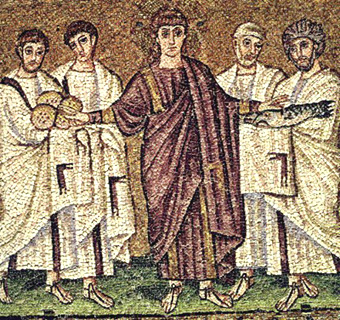“Nazareth? Can anything good come from there?” ~John 1:46
 Nathanael thinks there’s no way the Messiah comes from Nazareth. The all-time religious headquarters were in Jerusalem, home of the temple, the priests, and the Ark of the Covenant. Rabbis came from the south; that’s where they were born and raised and educated. Rabbis don’t come from the fishing villages in Galilee. And neither does the promised Christ. Nathanael’s rolling his eyes. Whatever.
Nathanael thinks there’s no way the Messiah comes from Nazareth. The all-time religious headquarters were in Jerusalem, home of the temple, the priests, and the Ark of the Covenant. Rabbis came from the south; that’s where they were born and raised and educated. Rabbis don’t come from the fishing villages in Galilee. And neither does the promised Christ. Nathanael’s rolling his eyes. Whatever.
Some people see Christianity that way. Nathanael rolls his eyes at Jesus. Lots of people today roll their eyes at Christianity. We talk about Jesus — who he is, what he’s done for us, submitting our lives to him — and some people say, “Oh, yeah, Christianity. Been there, done that, got the cross-shaped necklace and the Jesus fish for my car. But that was a long time ago. I grew up in church but I’m not into that anymore. I’ve grown up. I’ve moved past that. I’m too smart for that.”
See, Jesus is still from Nazareth.
But people who dismiss Christianity are cutting themselves off from the very source of a lot of their core beliefs. Their values can probably be traced back to Christianity.
The idea of living in a peaceful civilization, of reaching out in kindness to your enemies instead of killing them, came from Jesus. Nobody thought like that before Christianity.
The concept that every single human being has value and dignity, that every person should be treated with respect — that came from the Bible. It stems from the Christian belief that all men and women, regardless of talent or wealth or race or gender, are made in the holy image of God.
Taking care of the poor is a Christian thing to do. In pre-Christian Europe, all the elites of society thought it was crazy to love your enemies or take care of the poor. They said society would fall apart because that’s not the way the world works. The strong and talented are born to prevail. Winner takes all. The poor are born to suffer. That’s just how things are. Christianity comes along and stresses love for all, including enemies, and taking care of the poor and the orphaned.
You’ll run into some people, though, who say, “I can believe those things and practice those things without Christianity. I don’t have to believe all the Son of God stuff and resurrection stories to hold these values and practice these good works.”
Well, that’s possibly true at one level. Possibly. But it seems really shortsighted.
Why would you accept and embrace some parts of Christianity and take them into the core of who you are, but reject all the parts that make sense of the parts you like? If you concede that the source of a lot of your strongest convictions is actually Christ Jesus, why would you reject the parts of the story that explain those concepts and make it all coherent?
Don’t be like Nathanael. Don’t let a conviction that Christianity is outdated or intellectually unsophisticated blind you to what it offers. Watch out for pride and prejudice. Be aware of contempt and being dismissive. Those kinds of attitudes are poisonous in all aspects of life, but especially where you’re asking life’s biggest, most important questions.
Everybody’s looking for the answers to life’s biggest questions. And nobody’s overly satisfied with the answers given by the culture or the universities or the world’s philosophies.
Wrestle with Christianity. Consider it again. Look at its claims with fresh sensitivities. And stop rolling your eyes.
Peace,
Allan
Leonard,
I think a lot of people who consider themselves as Christians have re-written it to say Mexico or Central America or Syria or any brown skinned people and what good can come from that.
I do hope we all go back and look at it with fresh sensitivities and then apply it.